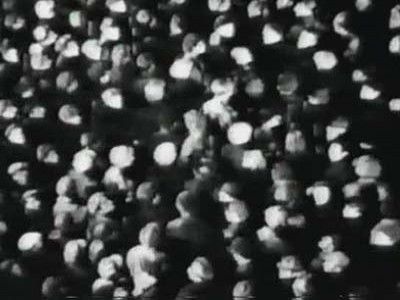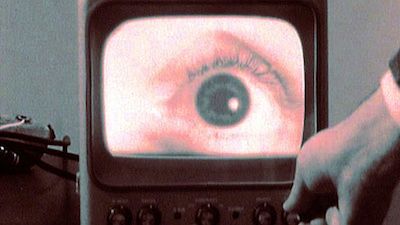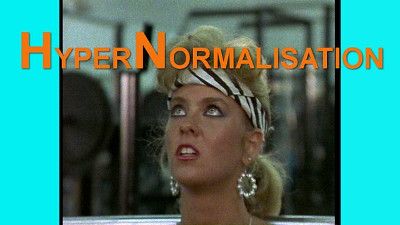The BEST episodes directed by Adam Curtis

#1 - Bitter Lake
BBC Documentaries - Season 2015 - Episode 28
Politicians used to have the confidence to tell us stories that made sense of the chaos of world events. But now there are no big stories and politicians react randomly to every new crisis - leaving us bewildered and disorientated. Bitter Lake is a new, adventurous and epic film by Adam Curtis that explains why the big stories that politicians tell us have become so simplified that we can’t really see the world any longer. The narrative goes all over the world, America, Britain, Russia and Saudi Arabia - but the country at the heart of it is Afghanistan. Because Afghanistan is the place that has confronted our politicians with the terrible truth - that they cannot understand what is going on any longer. The film reveals the forces that over the past thirty years rose up and undermined the confidence of politics to understand the world. And it shows the strange, dark role that Saudi Arabia has played in this. But Bitter Lake is also experimental. Curtis has taken the unedited rushes of everything that the BBC has ever shot in Afghanistan - and used them in new and radical ways. He has tried to build a different and more emotional way of depicting what really happened in Afghanistan. A counterpoint to the thin, narrow and increasingly destructive stories told by those in power today.

#2 - The Phantom Victory
The Power of Nightmares - Season 1 - Episode 2
The Power of Nightmares continues its assessment of whether the threat from a hidden and organised terrorist network is an illusion. Part two, the Phantom Victory looks at how two groups, radical Islamists and neo-conservatives with seemingly opposing ideologies came together to defeat a common enemy. Among the many foreigners drawn to Afghanistan was a young, wealthy Saudi called Osama Bin Laden. In the second episode, Islamist factions, rapidly falling under the more radical influence of Zawahiri and his rich Saudi acolyte Osama bin Laden, join the Neo-Conservative-influenced Reagan Administration to combat the Soviet Union's invasion of Afghanistan. They are successful in repulsing the Soviet armies and, when the Eastern Bloc begins to collapse in the late 1980s, both groups believe they were the primary architect of the "Evil Empire's" defeat and thus have the power to carry out their revolutions in their homelands. Curtis instead argues that the Soviets were on their last legs and were doomed to collapse without intervention.
Watch Now:Amazon
#3 - There Is a Policeman Inside All Our Heads. He Must Be Destroyed
The Century of the Self - Season 1 - Episode 3
In the 1960s, a radical group of psychotherapists challenged the influence of Freudian ideas in America. They were inspired by the ideas of Wilhelm Reich, a pupil of Freud's, who had turned against him and was hated by the Freud family. He believed that the inner self did not need to be repressed and controlled. It should be encouraged to express itself. Out of this came a political movement that sought to create new beings free of the psychological conformity that had been implanted in people's minds by business and politics. This programme shows how this rapidly developed in America through self-help movements like Werber Erhard's Erhard Seminar Training - into the irresistible rise of the expressive self: the Me Generation. But the American corporations soon realised that this new self was not a threat but their greatest opportunity. It was in their interest to encourage people to feel they were unique individuals and then sell them ways to express that individuality. To do this they turned to techniques developed by Freudian psychoanalysts to read the inner desires of the new self.
Watch Now:Amazon
#4 - The Use and Abuse of Vegetational Concepts
All Watched Over by Machines of Loving Grace - Season 1 - Episode 2
A series of films exploring the idea that we have been colonised by the machines we have built. Although we don’t realise it, the way we see everything in the world today is through the eyes of the computers. This is the story of how our modern scientific idea of nature, the self-regulating ecosystem, is actually a machine fantasy. It has little to do with the real complexity of nature. It is based on cybernetic ideas that were projected on to nature in the 1950s by ambitious scientists. A static machine theory of order that sees humans, and everything else on the planet, as components—cogs—in a system. But in an age disillusioned with politics, the self-regulating ecosystem has become the model for utopian ideas of human ‘self-organizing networks’—dreams of new ways of organising societies without leaders, as in the Facebook and Twitter revolutions, and in global visions of connectivity like the Gaia theory. This powerful idea emerged out of the hippie communes in America in the 1960s, and from counterculture computer scientists who believed that global webs of computers could liberate the world. But, at the very moment this was happening, the science of ecology discovered that the theory of the self-regulating ecosystem wasn’t true. Instead they found that nature was really dynamic and constantly changing in unpredictable ways. But the dream of the self-organizing network had by now captured our imaginations—because it offered an alternative to the dangerous and discredited ideas of politics.
Watch Now:Amazon
#5 - Happiness Machines
The Century of the Self - Season 1 - Episode 1
The story of the relationship between Sigmund Freud and his American nephew, Edward Bernays. Bernays invented the public relations profession in the 1920s and was the first person to take Freud's ideas to manipulate the masses. He showed American corporations how they could make people want things they didn't need by systematically linking mass-produced goods to their unconscious desires.
Watch Now:Amazon#6 - Are We Pigeon? Or Are We Dancer?
Can't Get You Out of My Head - Season 1 - Episode 6
The final episode tells how the strange paralysis that grips us today was created. How all the different forces of our age - that started out as separate have come together to create what is a block against imagining another kind of future than this. How, money and debt, melancholy over the loss of empire, the strange roots of modern conspiracy theories, the history of China, opium and opioids, Artificial Intelligence - and love and power have all fed into creating the present time of anxiety and fearfulness about the future. And whether modern culture, despite its radicalism, is really also part of the rigid system - in the West and in Russia and China - where those in power have run out of all ideas. The film also lays out what are the different possible roads from here into the future, and the choices we will have to make about the very different futures we will have to choose very soon.
Watch Now:Amazon
#7 - The Monkey in the Machine and the Machine in the Monkey
All Watched Over by Machines of Loving Grace - Season 1 - Episode 3
This episode looks at why we humans find this machine vision so beguiling. The film argues it is because all political dreams of changing the world for the better seem to have failed—so we have retreated into machine-fantasies that say we have no control over our actions because they excuse our failure. At the heart of the film is one of the most famous scientists in the world—Bill Hamilton. He argued that human behaviour is really guided by codes buried deep within us. It was later popularised by Richard Dawkins as “the selfish gene”. It said that individual human beings are really just machines whose only job is to make sure the codes are passed on for eternity.
Watch Now:Amazon
#8 - Love and Power
All Watched Over by Machines of Loving Grace - Season 1 - Episode 1
A series of films about how humans have been colonized by the machines they have built. Although we don’t realise it, the way we see everything in the world today is through the eyes of the computers. This is the story of the dream that rose up in the 1990s that computers could create a new kind of stable world. They would bring about a new kind global capitalism free of all risk and without the boom and bust of the past. They would also abolish political power and create a new kind of democracy through the internet where millions of individuals would be connected as nodes in cybernetic systems—without hierarchy. The film tells the story of two perfect worlds. One is the small group of disciples around the novelist Ayn Rand in the 1950s. They saw themselves as a prototype for a future society where everyone could follow their own selfish desires. The other is the global utopia that digital entrepreneurs in Silicon Valley set out to create in the 1990s. Many of them were also disciples of Ayn Rand. They believed that the new computer networks would allow the creation of a society where everyone could follow their own desires, yet there would not be anarchy. They were joined by Alan Greenspan who had also been a disciple of Ayn Rand. He became convinced that the computers were creating a new kind of stable capitalism—“Like a New Planet”, he said. But the dream of stability in both worlds would be torn apart by the two dynamic human forces—love and power.
Watch Now:Amazon
#9 - Eight People Sipping Wine in Kettering
The Century of the Self - Season 1 - Episode 4
This episode explains how politicians on the left, in both Britain and America, turned to the techniques developed by business to read and fulfil the inner desires of the self. Both New Labour, under Tony Blair, and the Democrats, led by Bill Clinton, used the focus group, which had been invented by psychoanalysts, in order to regain power. They set out to mould their policies to people's inner desires and feelings, just as capitalism had learnt to do with products. Out of this grew a new culture of public relations and marketing in politics, business and journalism. One of its stars in Britain was Matthew Freud who followed in the footsteps of his relation, Edward Bernays, the inventor of public relations in the 1920s. The politicians believed they were creating a new and better form of democracy, one that truly responded to the inner feelings of individual. But what they didn't realise was that the aim of those who had originally created these techniques had not been to liberate the people but to develop a new way of controlling them.
Watch Now:Amazon#10 - Part Six - 1994 to 1998
Russia 1985-1999: TraumaZone - Season 1 - Episode 6
The group around the president believe a war in Chechnya will save him. Others want the war to restore the glory of the Russian empire. The Oligarchs seize control of practically everything. In the upside down world gangsters become heroes for defending democracy.

#11 - Baby It's Cold Outside
The Power of Nightmares - Season 1 - Episode 1
In the past our politicians offered us dreams of a better world. Now they promise to protect us from nightmares. The most frightening of these is the threat of an international terror network. But just as the dreams were not true, neither are these nightmares. The first part of the series explains the origins of Islamism and Neo-Conservatism.
Watch Now:Amazon
#12 - The Engineering of Consent
The Century of the Self - Season 1 - Episode 2
The programme explores how those in power in post-war America used Freud's ideas about the unconscious mind to try and control the masses. Politicians and planners came to believe Freud's underlying premise - that deep within all human beings were dangerous and irrational desires and fears. They were convinced that it was the unleashing of these instincts that had led to the barbarism of Nazi Germany. To stop it ever happening again they set out to find ways to control this hidden enemy within the human mind.
Watch Now:Amazon
#13 - The Shadows In the Cave
The Power of Nightmares - Season 1 - Episode 3
The Power of Nightmares assesses whether the threat from a hidden and organised terrorist network is an illusion. In the concluding part of the series, the programme explains how the illusion was created and who benefits from it. The final episode addresses the actual rise of al-Qaeda. Curtis argues that, after their failed revolutions, bin Laden and Zawahiri had little or no popular support, let alone a serious complex organisation of terrorists, and were dependent upon independent operatives to carry out their new call for jihad. The film instead shows the United States government wanting to prosecute bin Laden in absentia for the 1998 U.S. embassy bombings, and needing to prove him to be the head of a criminal organisation to do so. They find a former associate of bin Laden, Jamal al-Fadl, and pay him to testify that bin Laden was the head of a massive terrorist organisation called "al-Qaeda". With the September 11th attacks, Neo-Conservatives in the new Republican government of George W. Bush use this created concept of an organisation to justify another crusade against a new evil enemy, leading to the launch of the War on Terrorism.
Watch Now:Amazon#14 - Part Seven - 1995 to 1999
Russia 1985-1999: TraumaZone - Season 1 - Episode 7
Suddenly the western bankers leave. Oligarchs take control and search for a new president to be their puppet. They choose Putin. Russians turn against “the curse of democracy".
#15 - Money Changes Everything
Can't Get You Out of My Head - Season 1 - Episode 3
The story of how in the 1970s those in power set out to create a world free of the dangerous big ideas of the past. They banished the grand dreams of changing the world. And replaced them with money. People would live from now on in their own heads – in their own dreams. And the banks would lend them the money to create those dreams. While China would supply a wave of cheap consumer goods on a scale never seen before in the world. But then money broke free across the world. And people started to get frightened that things were out of control. Not just money - but the world’s climate too seemed to be behaving in a strange, unpredictable way. The systems seemed to have a life of their own. Beyond the ability of anyone to shape and predict
Watch Now:Amazon#16 - The Lordly Ones
Can't Get You Out of My Head - Season 1 - Episode 5
It wasn’t just the Slave Trade. 150 years ago Britain had wrecked China by forcing opium on the country. It made Britain the richest and most powerful country in the world. But it enslaved the minds of millions of the Chinese and helped destroy the society. But then the British got frightened of what they had done and created a dream image of a Britain that had never existed. To hide from the fear. This film tells the story of how from the end of the 19th century a magical vision of Britain’s feudal past was created by artists and writers. How folk music and folk dancing was invented to create a kind of safe dream of the nation that could hide the violence and the horrors. The dream persisted under the surface of the 20th century. But as the fears and uncertainties and the chaos of the last few years rose up millions of people started to believe that dream. That it was real.
Watch Now:Amazon#17 - Part One - 1985 to 1989
Russia 1985-1999: TraumaZone - Season 1 - Episode 1
Perestroika. The dream of saving communism. But no-one believes in anything any longer. The managers loot the system. Soldiers return defeated in the war to liberate Afghanistan.
#18 - The Lonely Robot
The Trap: What Happened to Our Dream of Freedom - Season 1 - Episode 2
The second episode reiterated many of the ideas of the first, but developed the theme that the drugs such as Prozac and lists of psychological symptoms which might indicate anxiety or depression were being used to normalize behavior and make humans behave more predictably, like machines.
Watch Now:Amazon#19 - But What If the People Are Stupid?
Can't Get You Out of My Head - Season 1 - Episode 4
No one trusted politics or politicians any longer. Instead we were all one world of free individuals. And we could intervene to save other individuals around the world without bothering with old politics and power. And people became what they as individuals truly were – emotionally and sexually. But power was mutating and finding ways to work its way back into our heads. The politicians realised that they no longer had the support or the trust of the people. So they switched sides and gave up being our representatives who would challenge the powerful on our behalf. Instead they began to tell us what to do on behalf of the powerful. And they made new alliances - with the psychologists who said that human beings were irrational and needed to be managed. But we didn’t notice because we were too busy shopping.
Watch Now:Amazon#20 - Part Five - 1993 to 1996
Russia 1985-1999: TraumaZone - Season 1 - Episode 5
Russian society implodes. Millions of people fall into the abyss. Many live underground or in forests. The president attacks parliament with tanks saying he is saving democracy.
#21 - We Will Force You To Be Free
The Trap: What Happened to Our Dream of Freedom - Season 1 - Episode 3
The final program focused on the concepts of positive and negative liberty introduced in the 1950s by Isaiah Berlin. Curtis briefly explained how negative liberty could be defined as freedom from coercion and positive liberty as the opportunity to strive to fulfill one's potential. Tony Blair had read Berlin's essays on the topic and wrote to him in the late 1990s, arguing that positive and negative liberty could be mutually compatible. He never received a reply, as Berlin was on his death bed.
Watch Now:Amazon#22 - Part Two - 1989 to 1991
Russia 1985-1999: TraumaZone - Season 1 - Episode 2
There are no potatoes in Moscow. Things get worse. Then they get much worse as the rational Communist plan runs out of control everywhere. But McDonald’s opens in Moscow.
Watch Now:Amazon#23 - Shooting and F**king are the Same Thing
Can't Get You Out of My Head - Season 1 - Episode 2
The story of what tore the revolutions in the 1960s apart. Jiang Qing in China, Michael X in London, Afeni Shakur in New York believed that millions of people’s minds were haunted by the corruption and the violence of the past. They wanted to show people how to escape those ghosts. But they hadn’t reckoned with the fact that the old structures of power still haunted their minds too. They too had been scarred by the past – and some of them wanted violent revenge. While psychologists and neuroscientists were starting to discover what they said were hidden forces inside the human brain that really controlled what they did. But the people weren’t aware.
Watch Now:Amazon#24 - Bloodshed on Wolf Mountain
Can't Get You Out of My Head - Season 1 - Episode 1
We are living through strange days. Across Britain, Europe and America societies have become split and polarised. There is anger at the inequality and the ever growing corruption - and a widespread distrust of the elites. Into this has come the pandemic that has brutally dramatised those divisions. But despite the chaos, there is a paralysis - a sense that no one knows how to escape from this. Can’t Get You Out of My Head tells how we got to this place. And why both those in power - and we - find it so difficult to move on. At its heart is the strange story of what happened when people’s inner feelings got mixed up with power in the age of individualism. How the hopes and dreams and uncertainties inside people's minds met the decaying forces of old power in Britain, America, Russia and China. What resulted was a block not just in the society - but also inside our own heads - that stops us imagining anything else than this.
Watch Now:Amazon#25 - Part Four - 1992 to 1994
Russia 1985-1999: TraumaZone - Season 1 - Episode 4
Russia goes through the mirror into a chaotic dream world where nothing is stable any more. Dream visions of Russia's imperial past start to rise up. People cannot afford food.
#26 - Part Three - 1991
Russia 1985-1999: TraumaZone - Season 1 - Episode 3
The empire strikes back. Hardliners attempt a coup. Power slips through their shaking hands. Oligarchs publish a manifesto. Money will replace all ideology. Yeltsin seizes power.
#27 - Fuck You, Buddy
The Trap: What Happened to Our Dream of Freedom - Season 1 - Episode 1
In this episode, Curtis examines the rise of game theory during the Cold War and the way in which its mathematical models of human behaviour filtered into economic thought with particular reference to the work of John Nash, who believed that all humans were inherently suspicious and selfish creatures that strategised constantly.
Watch Now:Amazon#28 - The Cost of Treachery
BBC Documentaries - Season 1984 - Episode 6
In 1949, at the height of the Cold War, the British and American Governments decided to fight back at the growing Soviet Empire with a secret plan of subversion. MI6 and the CIA would try to bring down the smallest and most vulnerable of the new Soviet-controlled regimes - Albania. In this film, for the first time, many of the agents involved tell their extraordinary story. It includes moonlit landings on deserted beaches, poison capsules, mysterious deaths in New York hotel rooms, and the crack bodyguard of King Zog. For some of the spies it was exhilarating fun and part of a great game. For the Albanians involved it was to mean death, for in the midst of the operation was a traitor.

#29 - HyperNormalisation
BBC Documentaries - Season 2016 - Episode 302
We live in a time of great uncertainty and confusion. Events keep happening that seem inexplicable and out of control. Donald Trump, Brexit, the War in Syria, the endless migrant crisis, random bomb attacks. And those who are supposed to be in power are paralysed - they have no idea what to do. This film is the epic story of how we got to this strange place. It explains not only why these chaotic events are happening - but also why we, and our politicians, cannot understand them. It shows that what has happened is that all of us in the West - not just the politicians and the journalists and the experts, but we ourselves - have retreated into a simplified, and often completely fake version of the world. But because it is all around us we accept it as normal. But there is another world outside. Forces that politicians tried to forget and bury forty years ago - that then festered and mutated - but which are now turning on us with a vengeful fury. Piercing though the wall of our fake world.